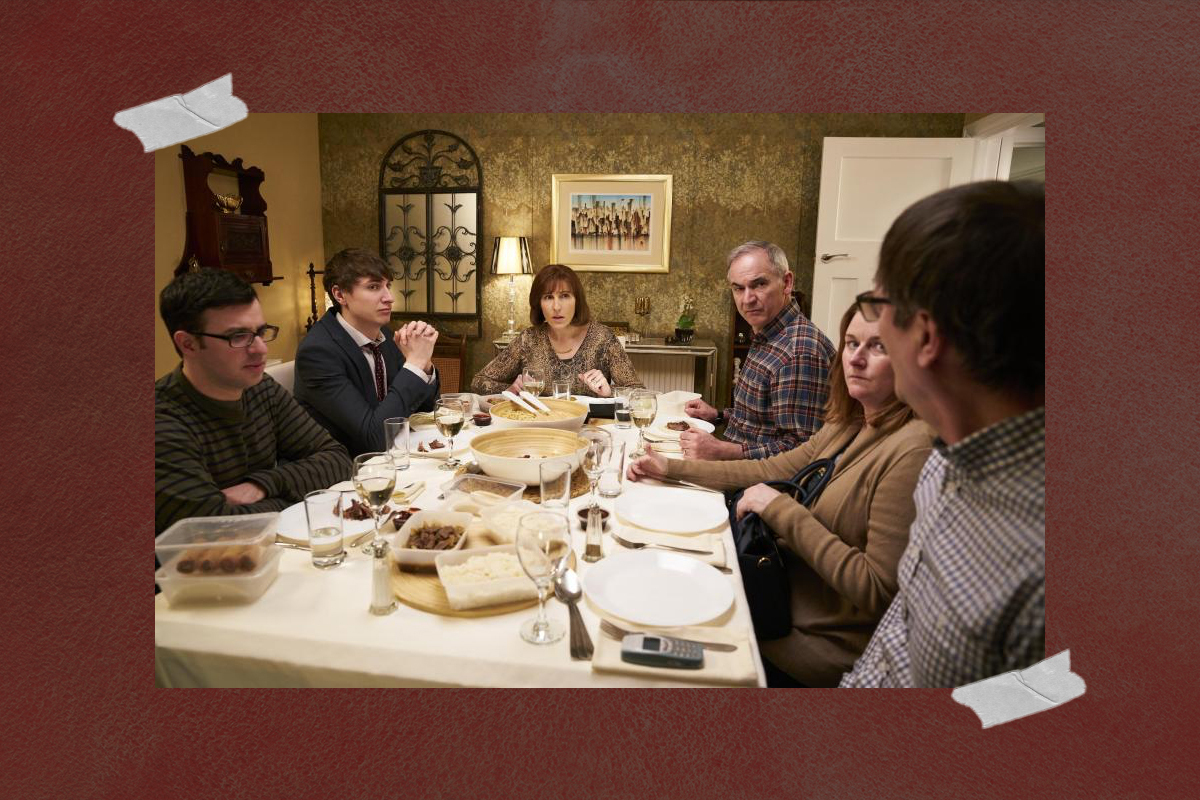Along with the rest of the world, I woke up to the incredibly sad news this week that British actor Paul Ritter passed away from a brain tumor at just 54 years old. Ritter was an extraordinarily versatile and effective actor who had roles in everything from Chernobyl to Harry Potter. There is no doubt, however, that he is best known for playing the equal parts loveable and infuriating Jewish dad Martin Goodman in the British sitcom Friday Night Dinner.
Friday Night Dinner is special for a number of reasons. In the UK, the show is one of the most popular sitcoms of the last decade. The sixth and sadly last season was released last year, and we are coming up to the 10th anniversary of its premiere, with a commemorative retrospective including Ritter being aired later this year. It’s also Jewish. Very Jewish. I mean that’s hardly surprising, it’s called Friday Night Dinner, and as you would expect, each episode takes place over Shabbat dinner. This is notable because in the UK, Jewish humor is not as well known or as easily identifiable as it is in the States. Most Jewish comedy is imported from the US (Curb Your Enthusiasm, Seinfeld, Broad City) and elsewhere (I’m looking at you, Schitt’s Creek).
Similarly, Jews are generally less visible in the UK. There are only about 250,000 of us compared to the 6 million in the US. Yet, Friday Night Dinner is watched by millions, which means that Ritter (and the rest of the cast) had an important job on their hands. They were introducing lots of people to Judaism for the first time.
That is really not an exaggeration. My sister was walking down the street with her non-Jewish housemate at University and they bumped into a Jewish friend. Naturally, my sister playfully greeted her Jewish acquaintance with a “shalom.” Her housemate laughed and said, “Oh, you must watch Friday Night Dinner!” — thinking “shalom” was the just the flagship catchphrase from the show, not the Hebrew word for hello (and goodbye and peace). When I asked a couple of non-Jewish friends what they learned about Jewishness from Friday Night Dinner, every single person came back with the same answer: they learned that Friday night — AKA Shabbat — dinners exist.
At this point, I should mention that Ritter was not Jewish. None of the cast were, aside from Tracy Ann Oberman who plays probing family friend Auntie Val brilliantly. Despite the fact that Simon Bird looks like every guy I kissed on Israel Tour, and that Tom Rosenthal has a Jewish dad, none of the cast identify as Jewish. There is also the slightly controversial point that Friday Night Dinner did indeed used to air on Friday nights, which meant Jews who keep Shabbat and avoid technology were not able to see it alongside the rest of the country.
Yet, Ritter did something extraordinary that I don’t think any other non-Jewish actor has ever achieved. Ritter’s performance felt completely Jewish while avoiding Jewish stereotyping or caricatures. There’s no weird shrugging, no oy-veying, in fact no Yiddish expressions at all. While my father does wave his hands around a lot, he is much more similar to Ritter’s Martin Goodman than he is to, let’s say, Gary Oldman’s hammy portrayal of Herman Mankiewicz. It is so hard to portray or explain what being Jewish is, yet Martin Goodman is recognizably so: My Jewish dad also gets a lot of joy from repeating unfunny jokes, bringing up serious topics like the SS seemingly at random, and definitely would eat brie in the toilet.
My favorite scene ever is the conversation spindle, where Martin brings a homemade spinner to decide the conversation topic at the dinner table. His randomness and enthusiasm are utterly compelling and hysterical. It’s reminiscent of the time my parents thought it would be a great idea to buy a “Shabbat box of questions” full of similar conversation starters. My teenage sister and I immediately thought was the funniest thing that had ever happened and absolutely fell about laughing at our poor parents. The box was never seen again.
It all just feels very relatable to me, something I am definitely not used to seeing on TV. The show is set and filmed in North West London, where I’m from and where there is a large Jewish community. Rather tellingly, my mum’s best friend’s neighbor knows the couple who actually own the actual house it’s filmed in. The décor is reminiscent of the suburban Jewish households I grew up in, down to the staged professional photographs that Jackie (Tamsin Grieg) probably insisted on. However, Jewish or not, every person I spoke to commented on how relatable the series feels. One friend said the “awkward conversations about females were disturbingly familiar;” another mentioned how the Goodmans acted just like her own (non-Jewish) family.
And that right there is the point. Not only did Ritter give an insight into one particular Jewish world, he showed how really, it’s similar to all others. You don’t need to be Jewish to understand a nagging mother, bickering siblings, or indeed an annoying yet completely loving father.
The character of Martin Goodman is unique because of his complete lack of neuroses. He’s on the other end of the scale. It would be so easy for Ritter and the superb writer Robert Popper to go with the usual tropes of a Jewish dad, brimming with social anxiety, pushy and overwrought. Martin Goodman isn’t that. He’s full of warmth and refreshing confidence. I love a man who spends half the time with his shirt off.
As an aspiring British Jewish comedy writer and performer, it feels like Ritter has given me a personal masterclass. Ritter embodied a character who was as universal as he was specific, and that’s pretty miraculous. Thank you so much, Paul, for reflecting my family life on screen, and showing me how it’s not so different from anyone else’s.



